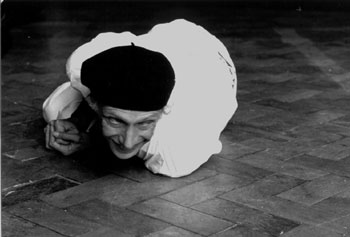 |
 |
 |
 |
 |
|
Chicken with Madness by Donald GardnerIf I were a dancer this is how I would do itRehearsing with Patrizia Filia |
|
When I wrote the text for Chicken with Madness it had another name and I had thought of it as a section of a book of poems and texts that I was writing. A meeting with Patrizia Filia changed all that. After an afternoon talking about our shared interests - writing, theater - , she asked me to show her something in my work. I read the text of Chicken uit Madness to her and she immediately started suggesting movements and I tried them out. From the beginning what has struck me has been the naturalness of our working partnership. Since I first started working in theater back in 1969, I have always felt torn between writing and acting. They have for me in a sense stood in each other’s light. It has always been the one or the other. At the same time I have longed for a synthesis, concerned as I have been with language as a spoken medium, not remaining on the printed page. Often the conflict between these two ways of working has been paralyzing: the result, a pile of unfinished work. For a long time I have been looking for a way of opening up my written work to the possibilities of performance: not the conventional form of poetry rend aloud, but the poem given its full stature as theatrical monologue, by being acted out. If at last I have been able to make some kind of synthesis it has been because I have found a director whose commitment to working experimentally is not theoretical but comes from a passion of life and who is not prejudiced by conventional concepts of form (this is a poem, this is theatre, and so on). Working on Chicken uit Madness I have felt that it will be a landmark in my work. The ease of working with her was what gave me the greatest pleasure. It was as if something that had been a problem for years suddenly dissolved. The kind of ease that makes one risk things one did not think oneself capable of. Not so much discovering who one is, but becoming someone else: creating oneself through one’s work. (As I rehearse I catch myself saying, I am not a dancer, but if I was this is how I would do it, and then she says, you should try it this way or this, and I do it). Rehearsals with her reminded me of the American poet, e. e. Cummings’ definition of poetry: “the beautiful answer that asks the still more beautiful question”. The answers one discovers in theatre are not the answers of the schoolroom, once and for all, and final, but are more like paths or hidden passages opening onto a world of new possibilities. This is important, because the relation between actor and director is an exemplary relation. Theatre like all existential research is dangerous work, not in an obvious way. We need to take risks, and these risks are only possible where there is a basis of trust. Between director and actor a kind of ideal openness can occur such as is rarely permitted to happen in ordinary life. It is an intensely personal relationship but at the same time it aims to achieve objective results that require the stripping away of anything that is false or excessive. Through the personal the personal is transcended. If this is allowed to happen, the performance that results can waken echoes and uncover forgotten places in the experience of the spectators, those places that are left untouched in a time where financial pressure so often leads to superficiality or an easy following of fashion. The term one-person theatre is misleading. Many
people join to put the actor on stage. Above all the director. The
peculiar combination of movement and poetry that Chicken with Madness
is made of would not have been possible without Patrizia Filia’s
guidance. In the finished creation it is of course impossible to
say which details were hers and which were mine. However if this
performance can affect an audience in the way I have described and
if I can express confidence in my own production it is in great
measure due to her direction. |
|
Donald Gardner (London 1938) is a British poet who lives in Amsterdam. In addition to Chicken with Madness and other performance work, he has published a number of books, the most recent of which is 'How to get the Most out of Your Jet Lag' (New Haven 2001). See also http://www.donaldgardner.net |
|
| back to Patrizia Filia | |
